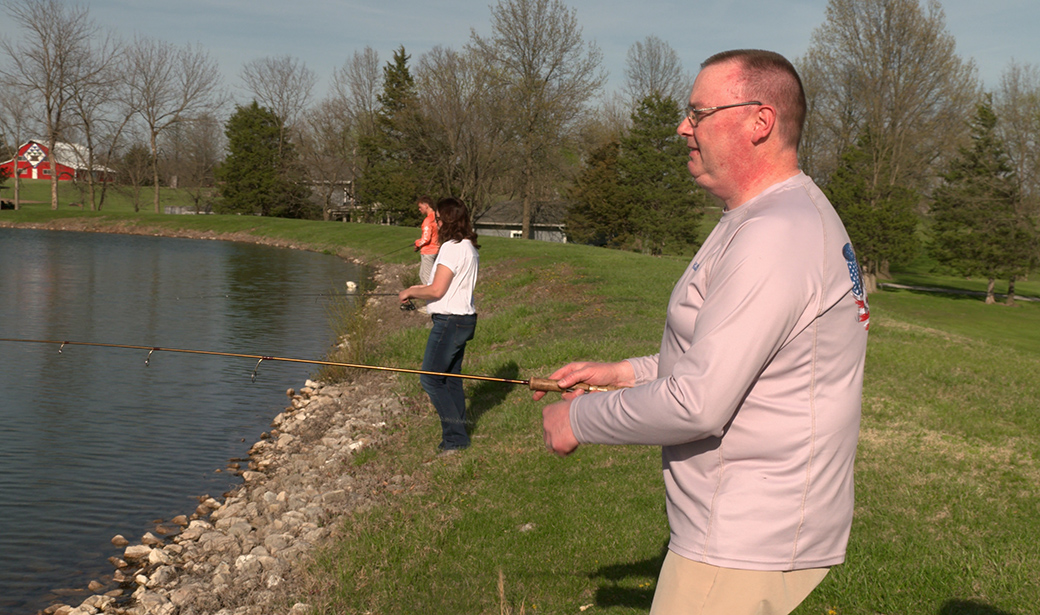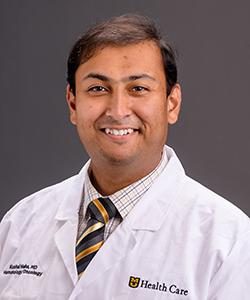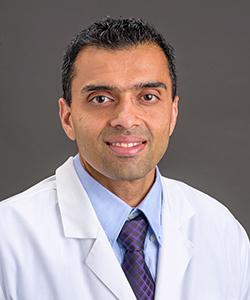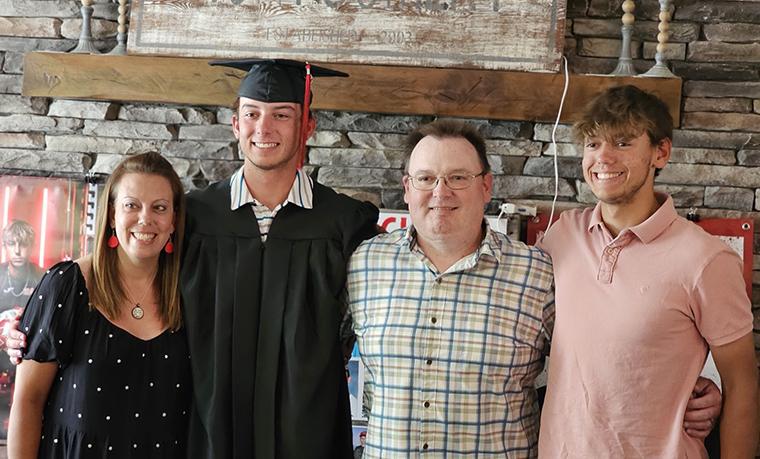Scott Montgomery is the kind of man who wakes up every morning and counts his blessings.
Some days those reflections of grace and gratitude are more common than others. Because Montgomery, a Hartsburg resident who loves being a dad and family man, who loves fishing and being outdoors, and who loves his church community, has lived through a lot.
By the age of 5, he survived an accidental gunshot wound to his face and was revived twice in the operating room. In 2009, at 33, he was diagnosed with multiple sclerosis, a neurological condition with no cure. Then, in 2019, bumps on his legs that Montgomery thought were bug bites cascaded into swollen and painful joints, visits to Quick Care, then Urgent Care, then a dermatologist, and finally to MU Health Care’s emergency room.
A biopsy of the bumps on his legs revealed they were caused by pancreatic panniculitis, a rare complication of damage to the pancreas. This led to a CT scan, which showed Montgomery had advanced tumors on his liver that were caused by pancreatic cancer. He was moved to an inpatient room where his family gathered, scared but determined.
“My oldest son, Caelan, heard my diagnosis and an internet search told him it meant a 1% survival rate,” Montgomery said. “He went to the doctors outside of my room and said, ‘My dad's already survived a gunshot wound, he's already lived with MS for a decade. I need you to help him be the 1% that survives pancreatic cancer.’ They did everything that they possibly could to give me a chance.”
It would be an uphill battle, but it was a battle Montgomery chose to fight. His MS, and the reduced ability of his pancreas and liver to function normally, made Montgomery’s case complex because some chemotherapy drugs can negatively impact the liver and nervous system.
“Wanting to be there for my family as my kids grew up, and my faith, were the reasons I chose to fight,” Montgomery said. “We knew the percentages weren’t great, but if you don’t try, you’ll never know. The people of Ellis Fischel and MU Health Care did a great job of meeting me where I was and supporting that decision.”
His care team at Ellis Fischel Cancer Center included Kushal Naha, MD, a hematologist and oncologist who specializes in gastrointestinal (GI) cancers, as well as other cancer doctors, neurologists, pathologists, nurses, palliative care, social workers and teams of support staff. Montgomery received two rounds of inpatient chemotherapy, at a lower dose because of his condition, and he was discharged to continue outpatient chemotherapy infusions.
“It's always a challenging proposition,” Naha said. “Careful thought is required when making these decisions, because it is possible that chemo would not have helped quickly enough or done more harm than good. But in the end, Scott decided to take that chance and go for treatment, and it was the right decision for him because he was able to get the cancer under control and dial back the damage done to his liver.”
Access to specialist care was key for Montgomery, who went through 32 more cycles of outpatient chemotherapy in 18 months at MU Health Care’s Ambulatory Infusion Clinic. Social workers helped him be as independent as possible at home while he used a wheelchair, nurses and pharmacists at the clinics made sure his infusions went smoothly, and physical and occupational therapists worked with him to keep and improve his motor skills.
After six months of chemotherapy, Montgomery had one tumor remaining on his liver. Ambarish Bhat, MD, an interventional radiologist, performed a minimally invasive procedure called percutaneous ablation, which uses a guided probe to kill tumor cells.
“MU Health Care, from the nursing staff to the doctors and all the people that I worked with when I was inpatient, when I was outpatient, were an incredible team,” Montgomery said. “They are remarkable people with the kindest hearts and really want the best, not just for their patients, but for their families and for those that are going along with them through this kind of a journey.”
That specialty care also included genetic testing. Montgomery’s cancer had a BRCA2 mutation, which can be passed from parents to children and is associated with increased risk of ovarian and breast cancers in women. Montgomery’s mother was negative, thankfully, and Montgomery advised the other women in his family of his mutation.
There was more good news for Montgomery following his genetic testing: A new class of drug that inhibits the growth of BRCA2 cancers had received FDA approval for use in patients during his chemotherapy. Montgomery was one of the first patients at MU Health Care to be offered Olaparib, a medication from this new group of drugs called PARP inhibitors, to manage his pancreatic cancer.
“BRCA-mutated cancer cells treated with PARP inhibitors have no way of repairing themselves, so they die off in a process we call synthetic lethality,” Naha said. “It’s like having a wobbly chair that is counting on one leg to stay standing. The cancer cells are teetering on the edge, and Olaparib kicks the last leg out and sends the cancer into a spiral.”
Switching to an oral medication, a pill he takes two of every morning and evening, was a big step forward for Montgomery. Chemotherapy is harsh on the body, and though medications like the one Montgomery takes have their own risks and side effects, changing maintenance treatments helped him get his life back.
On his most recent follow-up visit with Naha in February of 2024, four and a half years after being diagnosed with pancreatic cancer, Montgomery drove himself to Ellis Fischel Cancer Center and walked into his appointment without assistance.
“It feels so good to have that independence back, drive to the store if I want or go watch my sons play sports without needing a wheelchair,” Montgomery said. “This past fall, my wife got tickets for my son and I to watch the Florida game and we sat up by the Rock M in the stadium. It's incredible to know that we were able to do that again. Moments like that, you just don't take for granted on the back end of a journey like this.”
“I would not have believed the things Scott has been through if I hadn’t been involved in his care from the beginning,” Naha said. “I remember him walking into our meeting and what a moment that was for him. To see the difference in his life made a world of difference not only to him but to me, too.”
Montgomery has a few more boxes he wants to check before he considers himself fully recovered. An avid fisherman, he wants to be ready for topwater season this fall during the double brood cicada emergence.
“I want people to not give up hope if they’re diagnosed with pancreatic cancer, because I probably had less than a 1% chance when you consider everything I’ve been through, and I don’t think it’s because I’m a super special person,” he said. “I was surrounded by great people, great doctors and nurses and people who practice medicine, as well as my faith, all of which helped. If you want to fight, then fight with everything you have and know that the people at Ellis Fischel and MU Health Care will be right there with you to help you fight every step of that journey.”






